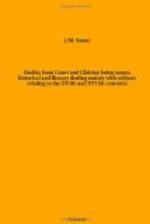Panzani’s mission to England falls about midway between the domestic storms which had troubled the early days of the royal marriage, and the Revolution which finally cost the most shifty of monarchs his throne and his life. Henrietta Maria had ceased to resent the expulsion of her French favourites, had consented at last to learn English and to tolerate the English people. She had thrown herself heart and soul into her husband’s interests, and since the death of Buckingham was in possession of his entire confidence. If, later on, any cloud arose over their mutual relationship, it was the king’s half expressed suspicion that she thought little of his powers of governing, and that however much she loved her husband, she did not admire his policy or trust his royal word as implicitly as he could wish. This is evident from one or two affectionate but querulous letters which he wrote to her when he was in the hands of the Parliamentarians.
Of the court, as well as of the private life of the king and queen, Panzani could report but favourably. The Catholics were to-be helped by the queen’s influence, and as to reunion with Rome, he thought he had some reason to be sanguine. A letter from Panzani to Cardinal Barberini, of which the following is a translation, is to be found among the Stevenson and Bliss transcripts of Vatican documents in the Record Office. It is dated June 10/25, 1635:
“According to your Eminence’s instructions, I have had a long talk with Father Philip (an English Capuchin and the Queen’s confessor), regarding the reconciliation of this kingdom with Rome, and the means of bringing it about. He told me that there were unmistakeable signs of a desire for such a reconciliation, not only in the King, but among the clergy and laity as well, and the question is mooted almost daily. It is well, however, to be slow in drawing inferences, because those who are most in favour of a reunion do not venture to manifest their desire, but rather dissemble it under the appearance of a contrary way of thinking, on account of the severity of the law against Catholics. This same fear possesses the King also, he being of a timid nature; hence the great misfortune of not being able to count on his prudence and judgment, seeing how changeable and uncertain he and his advisers are. Moreover, if by ill-luck the present rumours of war oblige the King to arm himself, we may expect some persecution of the Catholics,




